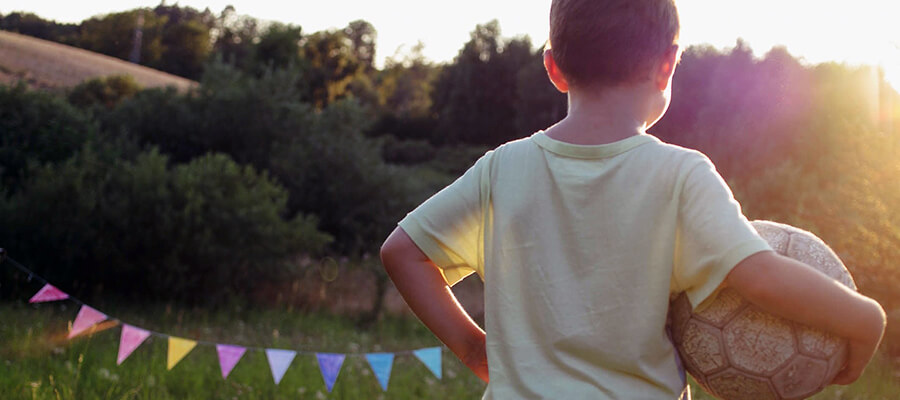Encouraging Independence in Youngsters
See also: Developing Interpersonal Skills in ChildrenPromoting activeness in children is never easy, but with ever-increasing rates of childhood obesity and related illnesses, it’s arguably never been so important.
So, in this article, we’re taking a look at the relationship between mentality and fitness, and how encouraging independence in your youngsters can have positive effect on their overall attitude towards fitness. As a child gains more and more independence, their confidence in their own abilities will begin to grow - leading to a healthier mindset and greater enthusiasm for embracing an active lifestyle.
Therefore, with that being said, this we will offer some handy tricks and tips on how to encourage independence in your child throughout their day to benefit their long-term development.

In the morning
It’s 7:30 am. Your child has woken up, is eating breakfast at a snail’s pace, yet to pack their school bag, and is styling a back-to-front, inside-out school jumper. Sound familiar?
If this is a regular occurrence in your weekday morning ritual, the thought of giving your child more freedom on a school morning might just be the stuff of nightmares - but by getting up just that little bit earlier, you can create the time to encourage independence in your child’s morning routine and reap the benefits in the long run.
For example, set aside 10 minutes for your child to brush or style their own hair in the morning. Though this is a one-minute job when you do it yourself, giving your child the time to do it themselves will increase their level of independence, and perhaps even increase cooperation when you remove the element of micromanagement.
Additionally, your children are never too young to begin learning about health and hygiene - while having a bath and brushing our teeth are part of our daily routine, it’s important to explain why. As children begin learning about this life skill, they’ll begin to understand how and why it fits into their schedule. By establishing healthy habits over time, they’ll become a natural part of their daily routine, meaning you won’t need to remind them of these tasks every day.
Once they reach an appropriate age of your choosing, encourage them to walk to school without your guidance - for example, if a school friend lives close by, they could begin walking in together. Not only will this give your kids a far greater sense of independence, but it’ll also get them excited about a physical activity (sorry to break it to you Mum and Dad, but they’ll be looking forward to walking to school without you cramping their style!)
At school
By the end of the first week of term, your child’s new coat, lunch box and jumper, and even a shoe, have likely mysteriously vanished.
Actively encouraging your child to look after their own belongings in school will increase their sense of independence and decrease the impact on your wallet!
A great solution to this is to encourage the use of school lockers for personal items. By having an area to store away their belongings, children will begin to foster an understanding of value and respect with regards to their own items and those of their peers - becoming more independent in the process. Many schools enable parents to rent out lockers term-to-term, or in some cases offer them for free, so ensure your child takes advantage of this by claiming theirs from the off.
At lunch, consider letting your little one have a say in what goes in their lunch box. However, to avoid the inevitable demand for a thousand chocolate bars and a side of pick 'n' mix, perhaps limit this to a certain food type. For example, give them the choice of which filling goes in their sandwich, or what fruit they’d like.
After school
Game consoles aren’t going anywhere anytime soon. It’s easy for many parents to panic at the prospect of their child being glued to their TV screens, forcing kids into an after-school activity they don’t want to do.
Instead, consider letting your child choose their own after-school activity. Not only will this help them to feel a greater sense of independence, but it also increases the chance of them finding an activity they’ll stick with by allowing them to take the reins. Whether they’re keen to pick up a musical instrument or take up a sport, doing something they enjoy will make them much more likely to stick to their new hobby.
Building Life Skills

Life skills go hand-in-hand with personal development and are a great way to set your child on the path to success for later life.
Children thrive on having a schedule, after all, having a routine encourages self-control and could even help them focus better. It could be as simple as talking about organisation and allocating some time for them to tidy their room in the evening - be that organising their school books or putting their shoes away in the hall.
Personal interaction will prove invaluable throughout your child’s life - so it’s best to start encouraging them at a young age. To learn healthy social skills, children need to recognise when and how to respond in social interactions, which will help them to make connections within social situations - after all, the more connections we make, the more sense and meaning we can make of the world. It could be as simple as having an engaging ‘adult’ conversation with your child without distractions and encouraging them to think without bias about certain situations.
By making just a few simple changes to your daily routine, you can instil a greater sense of independence in your child, nurturing confidence that will lead them to a healthier and happier lifestyle in the long term.
About the Author
Tom Brialey is the Founder and Director of Action Storage, which adopts his philosophy that, in addition to the highest quality products, you must also provide the highest standard of service to your customers in order to succeed. That’s why it’s Tom’s mission to provide expert support 100% of the way.
